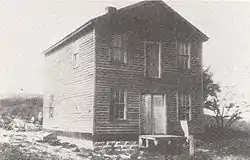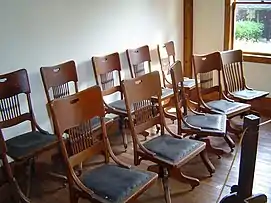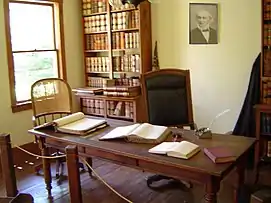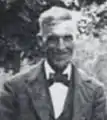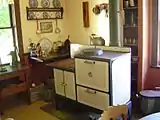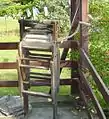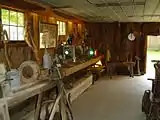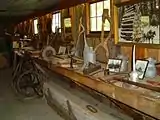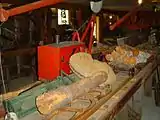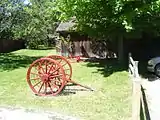White Pine Village
White Pine Village (also Historic White Pine Village) is an outdoor museum in Ludington, Michigan, containing nineteenth-century buildings and related historical items. The thirty buildings in the village contain artifacts relating to pioneer lumbering, music, farming, shipping, sports, and businesses. Occasionally performances are done on blacksmithing, spinning, leatherworking, candlemaking, wood carving, and basket making. The museum's centerpiece is an 1849 farmhouse.
| Historic White Pine Village | |
|---|---|
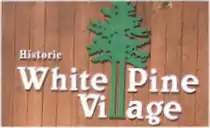 Sign on admission building of entrance | |
| Location | 1687 S. Lakeshore Drive, Ludington, Michigan |
| Coordinates | 43.9276°N 86.4457°W |
| Area | 23 acres (9.3 ha) |
| Governing body | Mason County Historical Society |
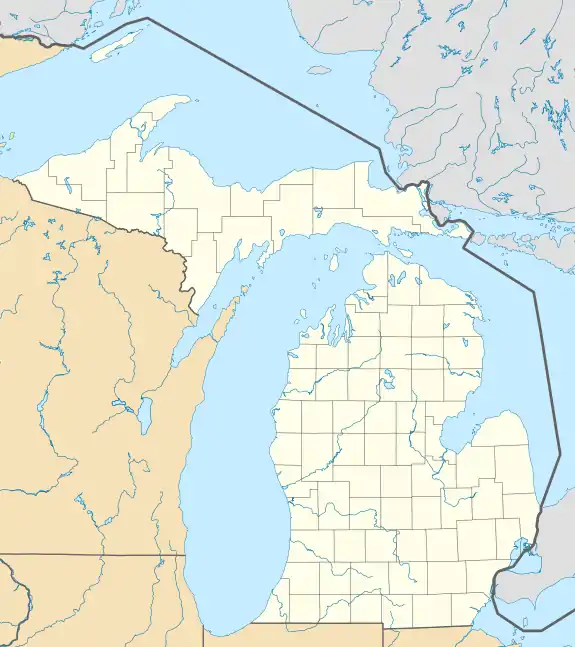 Location of Historic White Pine Village in Michigan | |
The Admission Building has a research library that has history material covering Western Michigan with emphasis on Mason County. The library contains old photographs, archival original newspapers, obituaries and a genealogy department. The library maintains an on-line research database that can be used to help locate the library material. The general public can use the library for a fee.
Description
White Pine Village is a self-guided outdoor museum located three miles south of Ludington in Mason County, Michigan.[1][2][3] It has thirty preserved and refurbished historic buildings of Michigan on the village grounds,[4] with period-costumed staff employees showing a particular building from time to time.[5] The grounds contain thousands of artifacts that are mostly from the nineteenth century.[6] White Pine Village shows how the early settlers of Michigan in the 1800s lived.[7][8][9]
The pioneer village attracts between about 15,000 and 18,000 tourists yearly.[10][11] About 400 volunteers are involved with the outdoor museum.[12] It has been listed as one of four unique tourist attractions in West Michigan by the Michigan Tourist Association and the Michigan Department of Transportation; the other three are the Shrine of the Pines in Baldwin, White River Light Museum in Whitehall, and the Music House Museum in Acme.[13] The museum is open as weather permits between April and October.[7][14]
Background
The idea of a pioneer-type history outdoor museum was that of Mrs. Rose Hawley, a Michigan historian, and the Mason County clerk Jerome Jorissen. When the Mason County Historical Society acquired the property land in 1967 Jorissen became the supervisor of Pioneer Village and Hawley became the curator of the Rose Hawley museum that had started in Ludington and eventually relocated onto the village property. Hawley had formed a historical society in 1937 in Ludington of 40 people that eventually became the Mason County Historical Society that owns the village. Jorissen, who donated the first piece of land, did much of the initial village layout and oversaw its general construction.[11][15][16]
The original Pioneer Village outdoor museum of twelve buildings on twenty-three acres (9.3 ha) opened in 1976 on the weekend of the Fourth of July to thousands of local residents.[17] It represents the history of Mason County since 1850.[2] The first buildings to be reconstructed were the first Mason County Courthouse, Marchido School, Pere Marquette Townhall, Trapper's Cabin (Mason County's first post office), General Store, Fire Barn, Abe Nelson Blacksmith Shop, Abe Nelson Lumbering Museum, The Livery exhibit building, the future Maritime Museum, the Village Chapel, and a barn.[18]
The museum's original name, "Pioneer Village", had been used for two years before it was discovered that a similar museum in Nebraska was already using the name, so it was changed. A contest to find a new name was held by the Mason County Historical Society and the new name selected for the museum was Historic White Pine Village (shortened to the more common usage of "White Pine Village").[18] The name came from the White Pine tree that was the focus of the lumber industry of northern Michigan in the nineteenth century.[19]
Buildings and museums
The thirty buildings on the grounds are small, individually-themed museums in their own right.[11][20] Many have been restored to their original designs.[21] Some have been "adopted" by local Mason County families, businesses, or organizations and are supported by them.[4] In addition, there are designated site areas on the grounds that display Mason County history.[11]
Admission Building
The George Petersen Sr. Admission Building is the main entrance to White Pine Village. It is the admission area and has a gift shop, the main office, Mason County Historical Society Research Library, and the coordinator of the village services. The library has history books, photographs, scrapbooks, documents, maps, and old newspapers.[5] The genealogy department has material that originally came from the main Ludington library. The archived materials include Mason County family histories, obituaries, and cemetery records.[5] The library also has historical business records of past companies of Mason County. There is an on-line research database to help historians find the various library materials' location within the building.[4] The general public can use the library for a fee.[22]
Burr Caswell's house
The Burr Caswell farmhouse was built in 1849; it was Mason County's first frame building.[23] In 1855, the bottom part of the house was converted to accommodate government use and served for five years as the first Mason County Courthouse.[24] Caswell, the first permanent white settler in Mason County, was born with the given name Aaron Burr after the United States vice-president. He was the county's first probate judge and later became a keeper for the Big Point Sauble lighthouse.[25] The farmhouse was also Mason County's first store and first jail.[15]
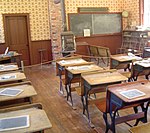
Marchido School
The Mason County, rural, one-room school was built in the 1890s. It was relocated to White Pine Village in 1973.[26] The exhibit was prepared by the Retired Teachers of Mason County with the help of volunteers. The exhibit represents a typical Michigan school of the late 1800s, where it was common for children to walk two miles (3.2 km) to attend school. School children groups often experience the school for the day and do activities that their nineteenth-century contemporaries would have done.[27] The school is completely restored to its original condition.[28]
Doctor's office
White Pine Village doctor's office is a building from nearby Custer, Michigan, built in the early 20th century. It housed Dr. Dogood's practice of 1916 and Dr. Blanchette's practice of 1917–47. The building was moved from Custer and restored as part of the outdoor museum.[29][30]
Rose Hawley museum
Rose Hawley was instrumental in founding Historic White Pine Village.[31] She also contributed to developing out four museums in downtown Ludington.[31] One museum in her name and its entire collection was moved in 1994 from Ludington to White Pine Village. The Rose Hawley museum originally opened in 1951. In 1960 the contents were moved to a larger facility and again in 1986.[32] The White Pine Village building has on display the original, third-order Fresnel lens from Big Sable Point Lighthouse.[33][34]
Fire station
The fire engine, which was made in 1937, is loaned to White Pine Village by Mike McDonald, a fireman who worked for the Ludington Fire Department from about 1959 to 1995.[11]
Burns farmhouse
Thomas Burns and his wife Mary lived in this farmhouse.[11] It came with eighty acres (32 ha) of land and the total cost was $1,190 in 1880.[11] They had four sons and five daughters.[11] Early-1900s food is cooked and served on special events at the farmhouse.[35][36] It is typical of late-nineteenth-century Michigan farmhouses.[37]
Print shop
The Siddon Print Shop museum building is the third log building erected on the village premises. It was previously the 1880s Siddon Post Office building that was located on Townline Road in Mason County, Michigan.[38] The post office was disassembled and the logs were shipped to White Pine Village, where a new foundation was prepared for reassembling.[38] After it was rebuilt a new roof was added to the building. The other two log buildings at the pioneer village are the General Store and Trapper's Cabin, which are clustered together with the print shop.[39]
Maritime museum
In 2001, after the Coast Guard Station in downtown Ludington moved to more modern facilities, The Mason County Historical Society negotiated to acquire the original location as an extension representing maritime history.[40] The station was purchased by the city and became part of White Pine Village. It shows the history of S.S. Badger, Big Sable Lighthouse, and North Pier Lighthouse.[41]
Lumbering museum
The museum building houses the personal collection of lumberman Abe Nelson of Ludington. He was born in Norway and his family moved to the United States when he four years old. Paul Bunyan was his idol, so he made items larger than normal.[11] The museum has an antique lumber camp pancake griddle and a brand used to mark logs owned by the Cartier Lumbering Company. The functioning 1901 Port Huron sawmill[42] is powered by a Huber tractor with a Ludington-made Stearns engine.[43] (see video demonstration in Illustrations)
An early 20th-century lumber camp in Victory Township was donated to house the museum. The two 100-year-old buildings were moved from their original location to White Pine Village.[44] The buildings, a blacksmith shop, and a cooking shanty were originally constructed by John G. Peterson, a local lumberman.[45] Michigan logging wheels that were used to drag logs out of the woods are displayed on the grounds.[45]
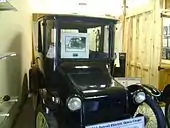
Car museum
The Max K. Rahn building houses the White Pine Village Car Museum. In 1994, Pere Marquette Township, in which White Pine Village is located, submitted a grant application to the Michigan Equity grant program for $20,000 for the car museum project.[46] The building size is about fifty-five feet (17 m) wide by approximately one hundred and sixty feet (49 m) in length. Several automobiles, including a 1917 Detroit Electric and a 1924 Model T-Ford, are displayed there..[47][48] There is also related antique car paraphernalia and an old gasoline pump.[49]
Blacksmith shop
The blacksmith shop is a recreation of Abe Nelson's past business. He was a railroad blacksmith in the Mason County area. The blacksmith shop often has a working blacksmith dressed in period bib overalls making iron items like horseshoes and fireplace pokers.[50]
Time museum
The Mason County Horological Society coordinated the making of the Village Time Museum.[51] The building housing the "Clock Shop" was constructed in 1990,[8] and officially opened on June 1, 1991. On display are several antique clocks and machines for making watches from the Star Watch Case Company, a watch manufacturer in Ludington for over 50 years.[52]
Post office
The contents in this building are those of the former Pentwater Post Office, which moved to a new location in 1972. Guy VanNortwick owned the contents and was its postmaster from 1956 until his death in 1974. He wanted the items to be given to a museum.[11]
Hardware store
The hardware building is a replica of the 1920s William Anderson Hardware Store formerly on South Madison Street in downtown Ludington.[53] The contents are original and displayed as they were in 1978, as verified from a photograph taken when the store closed.[54]
White Pine Chapel
The chapel was constructed by the village staff; it is from several architectural styles used in rural Mason County churches. The window in the narthex was financed by Scottville United Methodist Church. The sanctuary window, a memorial to an early Ludington pharmacist, and a Calvary cross were a gift from Grace Episcopal Church in Ludington, Michigan. One of the organs in the chapel was built around 1860 by the Star Organ Company. Riverton Township St. Paul United Methodist donated their steeple to the museum when they upgraded to another.[11]
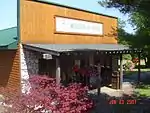
Museum of Music
The Museum of Music building displays the 100-year history of Scottville Clown Band as its main theme. Scottville is a town twenty miles (32 km) west of White Pine Village. The building also displays old instruments, music equipment, and antique radios.[11]
General store
The Cole’s General Store museum is the second log building at White Pine Village. The log cabin was the home of Henry Clay Cole and his wife Olive Beebe when they owned eighty acres (32 ha) in Summit Township of Mason County, Michigan. It was relocated to the outdoor museum grounds in 1975.[55][56]
Trapper's cabin
This is the first log cabin at White Pine Village. It was originally constructed by William Quevillon, a French trapper, during a hunting trip in Mason County around 1850.[16][57][58] Quevillion moved his family to his new home in 1852 from Grand Haven, Michigan,[16] and used the house concurrently as a family home and post office.[58] He became postmaster of Mason County in 1855 and his house became the first authorized county post office, delivering mail four times a year and processing about twenty-five letters a month.[16] He lived there with his wife Catherine and four children.[59] The cabin was owned by three other gentlemen after Quevillon, and was then donated and moved to the White Pine Village outdoor museum in 1969.[60]
Illustrations and demonstrations
Some of the occasional performances are that of blacksmithing, spinning, leatherworking, candlemaking, wood carving, and basket making.[61] Each season, special events that represent aspects of Michigan's nineteenth-century and early twentieth-century history are held.[62] Events include antique shows, American Civil War reenactments, ice cream socials, log cabin days, maritime stories, and music concerts.[63] The History in Action days consist of storytelling, farmhouse cooking, one-room schoolhouse mini-sessions, cider press demonstrations, barn loom weaving, flint knapping, windmill interpretations, sorghum press demonstrations, basket making, and pumpkin painting.[64] Children's Days involve historical illustrations and demonstrations of period clothes, games, baking, and songs.[65][66] The Jorissen Barn illustrates the handling and processing of milk.[67] The c.1900 town hall has an ice-cream parlor popular with children during warm, summer days. It has a marble fountain, and hand-crafted oak and leaded glass cabinets.[68]
American Civil War re-enactment
Re-enactments of The American Civil War are held each summer.[69] About thirty-six reenactors demonstrate camp living from time to time. This includes soldiers playing baseball, medical procedures like amputation, cannon firings, and rifle shooting.[70] Ceremonies include flag raising and lowering.[71] The annual re-enactment event is known as the Penfield Civil War Muster and involves Michigan Light Artillery batteries.[72][73]
See also
References
- "White Pine Village tells tale of long ago". Ludington Daily News. Ludington, Michigan. August 23, 1995. Retrieved August 24, 2016.
- Hulett, Jessica (October 14, 2002). "White Pine Village is part of test group". Ludington Daily News. Ludington, Michigan. Retrieved August 24, 2016.
- Counts 2014, p. 47.
- "30 BUILDINGS AND SITES TO EXPLORE". Historic White Pine Village. Mason County Historical Society. 2017. Retrieved December 30, 2017.
- Riedl, Marion (April 14, 2003). "Old stuff at White Pine Village". Ludington Daily News. Shoreline Media Group. Retrieved August 20, 2016.
- Hauck 2011, p. 117.
- Hutchins 2005, p. 75.
- "Lookin Back / Step Back in time at White Pine Village". Ludington Daily News. Ludington, Michigan. June 20, 1991. Retrieved August 24, 2016.
- "White Pine Village tells tale of long ago". Ludington Daily News. Ludington, Michigan. May 25, 1995. Retrieved August 26, 2016.
- Dufresne 2016, p. 123.
- Banninga, Mickey (March 29, 1976). "Rose Hawley Museum Marks 25th Year, But The Story Begins Before That". Ludington Daily News, page 3. Ludington, Michigan – via Newspapers.com
 .
. - "Operation of Whiten Pine Village explained to Literary Club". Ludington Daily News. Ludington, Michigan. January 9, 1996. Retrieved August 25, 2016.
- "White Pine Village listed". Ludington Daily News. Ludington, Michigan. April 14, 1989. Retrieved August 23, 2016.
- Semion 2009, p. 211.
- Naughton, Keith (July 31, 1982). "White Pine Village Has Its Own Interesting History". Ludington Daily News. Ludington, Michigan.
- "White Pine Village represents early days". Google News. Ludington Daily News. April 30, 1987. Retrieved August 19, 2016.
- "White Pine Village preserves history through traditional and modern measures". Ludington Daily News. Ludington, Michigan. June 11, 2001. Retrieved August 24, 2014.
- Riedl, Marion (April 14, 2001). "Traditional, modern measures tell area's history". Ludington Daily News. Ludington, Michigan. Retrieved August 24, 2016.
- "White Pine Village Ready For Visitors". Ludington Daily News. Ludington, Michigan. June 28, 1979.
- "Historic White Pine Village". Humanities & Social & Behavioral Sciences. Century Michigan University. 2016. Retrieved August 20, 2016.
- "White Pine Village preserves the past for the future". Ludington Daily News. Ludington, Michigan. August 10, 1985. Retrieved August 24, 2016.
- "We Support-Mason County Historical Society, Ludington (MI)". Historic Highway Guides. 2016. Retrieved August 20, 2016.
- Cabot, James (September 14, 1996). "Caswell had varied career in county". Ludington Daily News. Ludington, Michigan. Retrieved August 27, 2016.
- "First courthouse in White Pine Village / Burr Caswell's house was original county seat". Ludington Daily News. Ludington, Michigan. February 17, 1987. Retrieved August 27, 2016.
- Cabot, James L. (September 7, 1996). "Burr Caswell – first permanent settler".
- "Pioneer Village Continues To Take Shape". Ludington Daily News, page 2. Ludington, Michigan. June 10, 1975 – via Newspapers.com
 .
. - Beninati, Esther (June 1, 2000). "White Pine Village is ready for summer". Ludington Daily News. Ludington, Michigan. Retrieved August 23, 2016.
- "White Pine Village preserves the past for the future". Ludington Daily News. Ludington, Michigan. August 10, 1985. Retrieved August 26, 2016.
- "Former doctor's office going to White Pine". Ludington Daily News. Ludington, Michigan. October 14, 1992. Retrieved August 24, 2016.
- Begnoche, Steve (January 13, 1994). "Grants could help White Pine Village start car museum, doctor's office". Ludington Daily News. Ludington, Michigan. Retrieved August 24, 2016.
- Danilov 2005, p. 190.
- "Museum to be relocated to White Pine Village". Ludington Daily News. Ludington, Michigan. Retrieved August 23, 2016.
- "Historic Light Station Information and Photography: Michigan". United States Coast Guard Historian's Office. Archived from the original on May 1, 2017.
- Dempster & Berger 2002, p. 130.
- Riedl, Marion (April 14, 2001). "Theme dinners expand this year". Ludington Daily News. Ludington, Michigan. Retrieved August 26, 2016.
- Gray, Jane (June 18, 2001). "Village will offer a 'taste' of the past". Ludington Daily News. Ludington, Michigan. Retrieved August 26, 2016.
- "Farmhouse Opens At Village Sunday". Ludington Daily News. Ludington, Michigan. June 10, 1962. Retrieved August 26, 2016.
- Klevorn, Andy (October 15, 2003). "Village dedicates new print shop". Ludington Daily News. Ludington, Michigan. Retrieved August 28, 2016.
- Riedl, Marion (April 14, 2003). "New old stuff at White Pine Village". Ludington Daily News. Ludington, Michigan. Retrieved August 23, 2016.
- "Happy 25th anniversary, White Pine Village". Ludington Daily News. Ludington, Michigan. July 12, 2001. Retrieved September 1, 2016.
- Petersen, Dave (June 17, 2006). "Preserving former Coast Guard Station important to honoring history". Ludington Daily News. Ludington, Michigan. Retrieved August 24, 2016.
- Klevorn, Patti (February 6, 2003). "New logging museum in the works". Ludington Daily News. Ludington, Michigan. Retrieved August 23, 2016.
- "Mason County Historical Society receives grants that are expected to enhance WPV". Ludington Daily News. Ludington, Michigan. August 22, 2006. Retrieved August 24, 2016.
- Begnoche, Steve (December 2, 2005). "Lumbering legacy rich at White Pine Village". Ludington Daily News. Ludington, Michigan. Retrieved August 24, 2016.
- "Dr. Bill Anderson works on lumber museum". Ludington Daily News. Ludington, Michigan. July 4, 2009.
- "PM will submit grants on village's behalf". Ludington Daily News. Ludington, Michigan. January 12, 1994. Retrieved August 25, 2016.
- Kiessel, Jeff (October 6, 2006). "Car Museum open". Ludington Daily News. Ludington, Michigan. Retrieved August 25, 2016.
- "Classic auto joins four others at White Pine". Ludington Daily News. Ludington, Michigan. November 8, 1997. Retrieved August 25, 2016.
- "Plans drawn up for antique car museum at W.P. Village". Ludington Daily News. Ludington, Michigan. December 31, 1997. Retrieved August 25, 2016.
- Reed, Todd (June 28, 1979). "Step Back In Time With The White Pine Village Blacksmith". Ludington Daily News. Ludington, Michigan. Retrieved August 24, 2016.
- "White Pine Village tells tale of long ago". Ludington Daily News. Ludington, Michigan. August 24, 1994. Retrieved August 23, 2016.
- "White Pine will open Saturday; clock shop dedication planned". Ludington Daily News. Ludington, Michigan. May 31, 1991. Retrieved August 22, 2016.
- "At Village Festival / Local Families will be represented". Ludington Daily News. Ludington, Michigan. June 30, 1988. Retrieved August 21, 2016.
- "White Pine Village Plans Busy Weekend". Ludington Daily News. Ludington, Michigan. May 22, 1980. Retrieved August 29, 2016.
- Higginson, Cheryl (June 24, 1999). "Log Cabin Day to be observed locally". Ludington Daily News. Ludington, Michigan. Retrieved August 25, 2016.
- "Log cabins are focused on". Ludington Daily News. Ludington, Michigan. June 27, 1987. Retrieved August 25, 2016.
- Franklin 2001, p. 199.
- Higginson, Cheryl (July 9, 2001). "White Pine observes 25th anniversary". Ludington Daily News. Ludington, Michigan. Retrieved August 27, 2016.
- Reader's Digest 2003, p. 169.
- "Log Cabin Day will be celebrated here". Daily News. Ludington, Michigan. June 25, 1987. Retrieved August 25, 2016.
- "White Pine adds basket making to demonstration list". Ludington Daily News. Ludington, Michigan. June 21, 1988. Retrieved August 26, 2016.
- "White Pine Village plans busy season". Ludington Daily News. Ludington, Michigan. June 22, 1989. Retrieved August 29, 2016.
- "White Pine Village opens for summer season Saturday". Ludington Daily News. Ludington, Michigan. June 15, 1993. Retrieved August 24, 2016.
- "Autumn Days coming to White Pine Village". Ludington Daily News. Ludington, Michigan. October 3, 2006. Retrieved August 24, 2016.
- "Children's Days at White Pine filled with activities". Ludington Daily News. Ludington, Michigan. July 5, 2000. Retrieved August 24, 2016.
- "Two facilities offer exploration opportunities". Ludington Daily News. Ludington, Michigan. April 30, 1987. Retrieved August 24, 2016.
- Historic White Pine Village Adds Farming Display, Michigan History Magazine, archived from the original on October 8, 2016, retrieved September 1, 2016
- Michaelson, Mike (July 20, 2003), Dunes, Beaches and History Lure Travelers to Ludington, Mich, Daily Herald (Arlington Heights, IL), archived from the original on January 24, 2016, retrieved September 1, 2016
- "LOOKIN BACK: Civil War muster, Clown Band at White Pine Village". Ludington Daily News. Ludington, Michigan. July 18, 1991. Retrieved August 24, 2016.
- "Civil War re-enactors come to White Pine". Ludington Daily News. Ludington, Michigan. July 26, 2000. Retrieved August 24, 2016.
- "Civil War Muster at White Pine Village this weekend". Ludington Daily News. Ludington, Michigan. June 29, 1995. Retrieved August 24, 2016.
- "Civil War Muster at White Pine Village this weekend". Ludington Daily News. Ludington, Michigan. July 3, 1996. Retrieved August 24, 2016.
- "Civil War muster this weekend at White Pine Village". Ludington Daily News. Ludington, Michigan. July 18, 1985. Retrieved August 24, 2016.
Sources
- Counts, Jeff (June 2, 2014). Explorer's Guide Michigan. Countryman Press. ISBN 978-1-58157-695-5.
- Danilov, Victor J. (2005). Women and Museums: A Comprehensive Guide. Rowman Altamira. ISBN 978-0-7591-0855-4.
- Dempster, Daniel E.; Berger, Todd R. (2002). Lighthouses of the Great Lakes. Voyageur Press. ISBN 978-1-61060-437-6.
- Dufresne, Jim (August 1, 2016). Michigan Off the Beaten Path®: Discover Your Fun. Rowman & Littlefield. ISBN 978-1-4930-2636-4.
- Franklin, Dixie (2001). Michigan. Compass American Guides.
- Hauck, Gary L. (July 20, 2011). The Story of Heritage Village: Celebrating 25 Years. iUniverse. ISBN 978-1-4620-2551-0.
- Hutchins, Brian (2005). Michigan's West Coast: Explore the Shore Guide : a Journey to 500 Public Parks and Points of Access Along the Lake Michigan Shoreline. Abri-LLC. ISBN 978-0-9760754-9-3.
- Reader's Digest (2003). Off the Beaten Path: A Travel Guide to More Than 1,000 Scenic and Interesting Places Still Uncrowded and Inviting. Reader's Digest Association. ISBN 978-0-7621-0424-6.
- Semion, Bill (September 15, 2009). Fun with the Family Michigan: Hundreds of Ideas for Day Trips with the Kids. Rowman & Littlefield. ISBN 978-0-7627-5804-3.
External links
| Wikimedia Commons has media related to White Pine Village. |
- Historic White Pine Village website
- Civil War muster at Historic White Pine Village (4 minute YouTube video)
